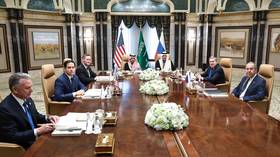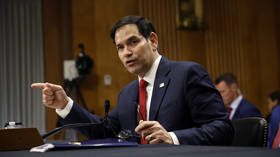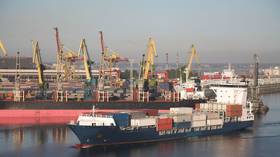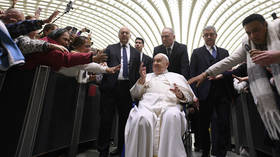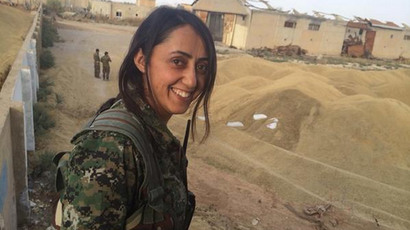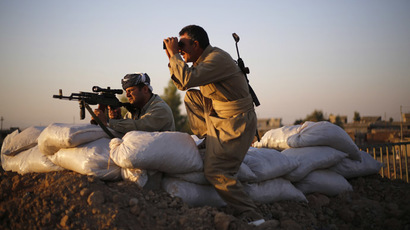Injured Kurds smuggle themselves from Syria to Turkey for medical help
Turkey’s border remains closed for Syrian Kurds battling the Islamic State for Kobani. But if wounded in skirmishes and seeking medical help, Kurdish fighters told RT they are forced to smuggle themselves over the Turkish border to avoid arrest.
A Syrian Kurdish commander, who opted not to disclose his name, told RT’s Paula Slier that he was injured on the same day his son was killed.
But the man had no time to bury his boy, who fell next to him in battle. With a severe leg injury and rapid blood loss, he urgently needed to get himself to hospital.
The YPG (People's Protection Units) commander said he had to lie to the Turkish army to let him cross the border and receive help because “if they’d known I was a fighter they’d have arrested me and not let me into Turkey.”
#YPG commander had to conceal his identity to get treatment in Suruc, telling #Turkish authorities he was a civilian pic.twitter.com/mpz7qvi60n
— PaulaSlier_RT (@PaulaSlier_RT) October 22, 2014
The bloody siege of the Syrian town of Kobani, situated on the border with Turkey, by the Islamic State (IS, formerly known as ISIS) militants has been underway since mid-September.
The jihadists have recently intensified their shelling in the area, which led to numerous deaths and injuries among the Kurdish forces protecting it.
In such conditions, the wounded YPG troops are forced to smuggle themselves across the border for treatment in Turkey and then perform the same arduous journey back to join their brothers-in-arms.
“If the Turkish Army looked at my injuries closely, they’d have known I’m a fighter, but of course I said I was a civilian,” Bave Mazlum, Syrian Kurdish fighter, told RT.
Bave, who was treated for five days after being hit in the back, says he hopes to return to Kobani the same night after leaving hospital.
“We cross through the back paths illegally. God created us to die, so we are not afraid to die,” he explained.
With #YPG fighters who say they want to return and protect #Kobani from #ISIS. pic.twitter.com/XWrc0KN3wu
— PaulaSlier_RT (@PaulaSlier_RT) October 22, 2014
The Kobani siege has become a real headache for Ankara, with Turkish President Recep Tayyip Erdogan saying that the Syrian Kurds are as bad as the jihadists.
The YPG fighters in turn accuse the Turkish authorities of assisting and providing weapons to the IS.
“I saw myself how the Turkish army was helping ISIS. People in the Arab villages told us how they helped 150 fighters cross the border into Syria. The Turks gave them 35 tanks and 100 shelka weapons, rockets, that they used to attack us,” the YPG commander said.
On Monday, Ankara announced it will allow Kurds to cross its border into Kobani, but they were only talking about Iraqi Kurds, representing the Kurdistan Regional Government (KRG).
READ MORE:Turkey to allow Iraqi Kurds to join battle against ISIS in Kobani
Turkey has a difficult relationship with the 15 million Kurds living in the country and the representatives of the stateless ethnic group residing in neighboring Iraq and Syria.
Ankara views the Iraqi Kurds as an ally, but its attempts to reach peace with Turkish Kurds – through the Kurdistan Workers Party (PKK) – have failed, with the situation deteriorating over events in Kobani.
As for the Syrian Kurds – represented by the Syrian Kurdish PYD (Democratic Union Party) - the Turkish authorities demand they give up the idea of Kurdish autonomy and join the Syrian opposition in the battle against Ankara’s long-time foe, Syrian President Bashar Assad.
The Kurdish conflict with various jihadist groups taking part in the Syrian civil war, including the IS, started on July 2013 in the Syrian town of Ras al-Ayn.
Kurdish forces recently managed moderate military gains against the IS in northern Iraq, but the jihadists seem to be taking the upper hand in Syria.
Turkey has stationed tanks not far from Kobani as a precaution, but expressed no desire to join the battle against the Islamic State on the ground, drawing angry comments even from Washington.
It also sparked violent Kurdish riots in southeastern Turkey as protestors demanded Ankara at least open a land corridor for volunteer fighters and reinforcements.




